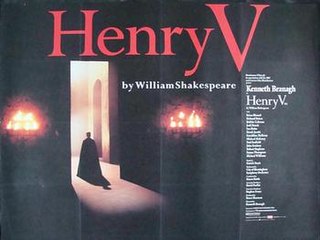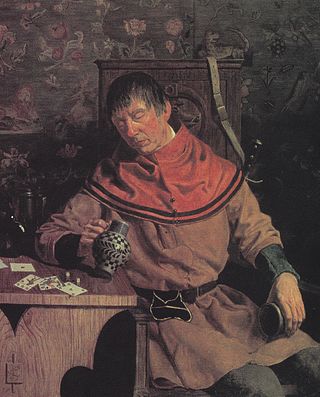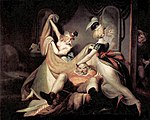
Sir John Falstaff is a fictional character who appears in three plays by William Shakespeare and is eulogised in a fourth. His significance as a fully developed character is primarily formed in the plays Henry IV, Part 1 and Part 2, where he is a companion to Prince Hal, the future King Henry V of England. Falstaff is also featured as the buffoonish suitor of two married women in The Merry Wives of Windsor. Though primarily a comic figure, Falstaff embodies a depth common to Shakespeare's major characters. A fat, vain, and boastful knight, he spends most of his time drinking at the Boar's Head Inn with petty criminals, living on stolen or borrowed money. Falstaff leads the apparently wayward Prince Hal into trouble, and is ultimately repudiated after Hal becomes king.

Falstaff is a comic opera in three acts by the Italian composer Giuseppe Verdi. The Italian-language libretto was adapted by Arrigo Boito from the play The Merry Wives of Windsor and scenes from Henry IV, Part 1 and Part 2, by William Shakespeare. The work premiered on 9 February 1893 at La Scala, Milan.

Henry V is a 1989 British historical drama film adapted for the screen and directed by Kenneth Branagh, based on William Shakespeare's play of the same name about King Henry V of England. The film stars Branagh in the title role with Paul Scofield, Derek Jacobi, Ian Holm, Emma Thompson, Alec McCowen, Judi Dench, Robbie Coltrane, Brian Blessed, and Christian Bale in supporting roles.

The Merry Wives of Windsor or Sir John Falstaff and the Merry Wives of Windsor is a comedy by William Shakespeare first published in 1602, though believed to have been written in or before 1597. The Windsor of the play's title is a reference to the town of Windsor, also the location of Windsor Castle in Berkshire, England. Though nominally set in the reign of Henry IV or early in the reign of Henry V, the play makes no pretence to exist outside contemporary Elizabethan-era English middle-class life. It features the character Sir John Falstaff, the fat knight who had previously been featured in Henry IV, Part 1 and Part 2. It has been adapted for the opera at least ten times. The play is one of Shakespeare's lesser-regarded works among literary critics. Tradition has it that The Merry Wives of Windsor was written at the request of Queen Elizabeth I. After watching Henry IV Part I, she asked Shakespeare to write a play depicting Falstaff in love.

Henry IV, Part 1 is a history play by William Shakespeare, believed to have been written no later than 1597. The play dramatises part of the reign of King Henry IV of England, beginning with the battle at Homildon Hill late in 1402, and ending with King Henry's victory in the Battle of Shrewsbury in mid-1403. In parallel to the political conflict between King Henry and a rebellious faction of nobles, the play depicts the escapades of King Henry's son, Prince Hal, and his eventual return to court and favour.

Henry IV, Part 2 is a history play by William Shakespeare believed to have been written between 1596 and 1599. It is the third part of a tetralogy, preceded by Richard II and Henry IV, Part 1 and succeeded by Henry V.

Ancient Pistol is a swaggering soldier who appears in three plays by William Shakespeare. Though full of grandiose boasts about his prowess, he is essentially a coward. The character is introduced in Henry IV, Part 2 and reappears in The Merry Wives of Windsor and Henry V.

Mistress Nell Quickly is a fictional character who appears in several plays by William Shakespeare. She is an inn-keeper, who runs the Boar's Head Tavern, at which Sir John Falstaff and his disreputable cronies congregate.

Dorothy "Doll" Tearsheet is a fictional character who appears in Shakespeare's play Henry IV, Part 2. She is a prostitute who frequents the Boar's Head Inn in Eastcheap. Doll is close friends with Mistress Quickly, the proprietress of the tavern, who procures her services for Falstaff.

Fluellen is a fictional character in the play Henry V by William Shakespeare. Fluellen is a Welsh Captain, a leader of a contingent of troops in the small army of King Henry V of England while on campaign in France during the Hundred Years' War. He is a comic figure, whose characterisation draws on stereotypes of the Welsh at that time, but he is also portrayed as a loyal, brave and dedicated soldier.
Sir John in Love is an opera in four acts by the English composer Ralph Vaughan Williams. The libretto, by the composer himself, is based on Shakespeare's The Merry Wives of Windsor and supplemented with texts by Philip Sidney, Thomas Middleton, Ben Jonson, and Beaumont and Fletcher. The music deploys English folk tunes, including "Greensleeves". Originally titled The Fat Knight, the opera premiered at the Parry Opera Theatre, Royal College of Music, London, on 21 March 1929. Its first professional performance was on 9 April 1946 at Sadler's Wells Theatre.

At the Boar's Head is an opera in one act by the English composer Gustav Holst, his op. 42. Holst himself described the work as "A Musical Interlude in One Act". The libretto, by the composer himself, is based on Shakespeare's Henry IV, Part 1 and Henry IV, Part 2.
"Henry V" is fourth episode of the first series of the British television series The Hollow Crown, based on the play of the same name by William Shakespeare. The episode was produced by Rupert Ryle-Hodges, directed by Thea Sharrock and starred Tom Hiddleston as Henry V of England. It was first broadcast on 21 July 2012 on BBC Two.

An Age of Kings is a fifteen-part serial adaptation of the eight sequential history plays of William Shakespeare, produced and broadcast in Britain by the BBC in 1960. The United States broadcast of the series the following year was hosted by University of Southern California professor Frank Baxter, who provided an introduction for each episode specifically tailored for the American audience. At the time, the show was the most ambitious Shakespearean television adaptation ever made, and was a critical and commercial success in both the UK and the US.

Bardolph is a fictional character who appears in four plays by William Shakespeare. He is a thief who forms part of the entourage of Sir John Falstaff. His grossly inflamed nose and constantly flushed, carbuncle-covered face is a repeated subject for Falstaff's and Prince Hal's comic insults and word-play. Though his role in each play is minor, he often adds comic relief, and helps illustrate the personality change in Henry from Prince to King.

Robert Shallow is a fictional character who appears in Shakespeare's plays Henry IV, Part 2 and The Merry Wives of Windsor. He is a wealthy landowner and Justice of the Peace in Gloucestershire, who at the time of The Merry Wives of Windsor is said to be over 80.

Falstaff's Wedding is a play by William Kenrick. It is a sequel to Shakespeare's plays Henry IV, Part 2 and The Merry Wives of Windsor. Most of the characters are carried over from the two Shakespeare plays. The play was first staged in 1766, but was not a success. It was infrequently revived thereafter.

Edward "Ned" Poins, generally referred to as "Poins", is a fictional character who appears in two plays by William Shakespeare, Henry IV, Part 1 and Henry IV, Part 2. He is also mentioned in The Merry Wives of Windsor. Poins is Prince Hal's closest friend during his wild youth. He devises various schemes to ridicule Falstaff, his rival for Hal's affections.

















